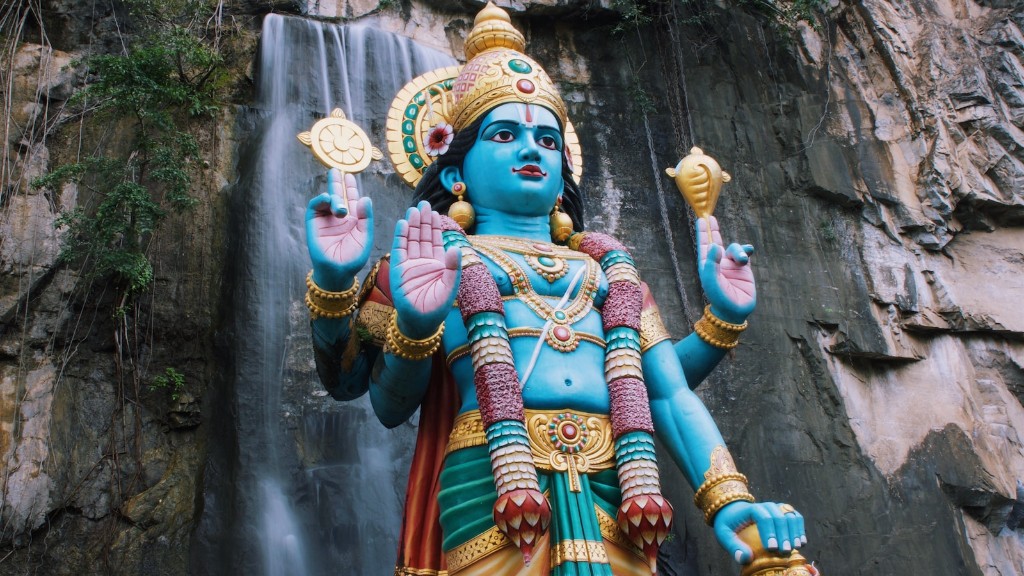Similar Origins
Buddhism and Hinduism are two of the oldest organized religious systems known to humanity today. They are both rooted in India, and share many cultural similarities, such as the veneration of a number of gods and similar religious rituals. Buddhism and Hinduism have their origins in the Vedic culture of ancient India, with the main difference being that Buddhism evolved out of Hinduism, whereas Hinduism stayed more or less in its original form. Both religions also share similar ideas and teachings, and many common belief systems.
Common Beliefs
One of the main shared beliefs between Buddhism and Hinduism is karma, or the concept of cause and effect in the spiritual paradigm. Karma states that our actions have consequences, and that good deeds lead to reward and bad deeds lead to suffering. This concept is crucial in both religions, as it explains why suffering exists in the world and how we can strive for spiritual liberation. Moreover, karma is seen as a powerful motivator for spiritual progress and the attainment of enlightenment.
Additionally, Buddhism and Hinduism both share an understanding of the law of reincarnation, or the belief that a being’s soul is reborn in a different body after death, which is determined by their karma. This is because karma shapes our lives and decides where we will be reincarnated. Furthermore, Buddhism and Hinduism both share the goal of spiritual liberation, known as moksha and nirvana respectively, which can only be achieved by ridding the soul of karma.
Different Aspects
Despite the commonalities between Buddhism and Hinduism, there are also some notable differences between the two religions. Buddhism, for example, rejects the notion of a supreme god and focuses on reaching enlightenment through self-realization and moral conduct. In contrast, Hinduism affirms the existence of a supreme god, believed to be all-knowing, all-pervading, and the source of all creation. In Buddhism, the aim of enlightenment is to end the cycle of rebirth, whereas in Hinduism, the aim is to attain union with God. In contrast to Hinduism, Buddhism also adopts the Four Noble Truths and the Eightfold Path as the cornerstone teachings of the religion.
The Contrast In Practices
Another distinguishing factor between Buddhism and Hinduism is their respective rituals and practices. Hinduism is largely focused on the performance of Brahmanical rites such as puja and yagna, whereas Buddhism has tended to move away from such religious ceremonies and instead focuses on meditation and contemplation as the primary forms of spiritual practice. Buddhism also rejects animal sacrifice and other ritual offerings that are commonly practiced in Hinduism.
Differing Views On The Divine
The differing views on the divine are also an important factor in distinguishing Buddhism from Hinduism. Although Hinduism is polytheistic in nature, it adopts the concept of Brahman—the underlying reality of all creation—which is often described as an impersonal universal spirit. Buddhism, however, does not accept the notion of a transcendental God that created the universe. Instead, the religion claims that all creations come into being through the interplay of various natural laws, and argues that it is up to the individual to practice morality and strive for spiritual liberation.
Enduring Influence
Despite the differences between Buddhism and Hinduism, both religions have had a profound and enduring influence on Indian culture and civilization. Both traditions have shaped India’s spiritual heritage, contribuing to an immense cultural tapestry of beliefs, philosophies, and practices. Today, these two ancient Indian religions remain some of the most important spiritual and cultural traditions in the world, and their influence can still be seen in many aspects of Indian life.
Different Schools Of Thought
One of the lesser-known aspects of Buddhism and Hinduism is the emphasis on learning and scholarship that both traditions have had for centuries. In Hinduism, for example, there are six different schools of thought – Nyaya, Vaisheshika, Samkhya, Yoga, Mimamsa, and Vedanta – that each explore classical teachings from different angles. Buddhism, meanwhile is based on the teachings of the Tripitaka or ‘three baskets’, which are divided into three sections namely the Sutra, Vinaya, and Abhidharma. Each school of thought has its own particular style of interpretation and analysis, which adds to the spiritual richness of both traditions.
The Role Of Language
The language used in each religion has also played an important role in expressing its beliefs and teaching. In the Hindu tradition, Sanskrit has long been the primary language used for religious purposes and is often seen as a sacred language. Buddhism, on the other hand, was founded on the Pali language, which is a hybrid of Siraha and Prakrit used in India in the 4th century BC. As Buddhism spread further, the Chinese, Tibetan, and Japanese also adopted their own language variations for use in practicing the religion.
Different Forms Of Devotion
While Buddhism and Hinduism both value devotion, the ways in which these religions express this devotion differ. For example, Hinduism typically focuses on devotion to individual gods such as Vishnu and Shiva, symbolizing an exclusive relationship between the worshiper and the deity. Buddhism, on the other hand, is based on the concept of self-effort and emphasizes the importance of developing loving-kindness and compassion towards all sentient beings. As such, many Buddhist practitioners practice dedicated meditation and contemplation as a means to attain spiritual liberation.
Role Of Philosophy
Philosophy has also played an important role in the development of both religions. Hinduism, for instance, has its roots in the Upanishads and believes in a cyclical view of time and reality. Buddhism, on the other hand, has its origins in the teachings of the historical Buddha, Siddhartha Gautama, who stressed the importance of relinquishing attachment to the external world in order to achieve spiritual enlightenment. Each religion has its own distinct philosophical system, yet both are founded on the concept of ethical self-reflection and the pursuit of knowledge.
The Influence Of Buddhism
Over time, Buddhism has played an important role in influencing Hindu thought and practices. Hinduism’s tolerance for other religions, its acceptance of the law of karma, and its notion of moksha all have been influenced by Buddhism. Additionally, the concept of non-violence, or ahimsa, is another principle that is held in high regard in both religions, with the Buddhist rejection of animal sacrifices becoming an important part of Hindu practices. Buddhism thus has had a major impact on the development of Hindu thought and ideology, and has left an indelible mark on the Indian spiritual heritage.

